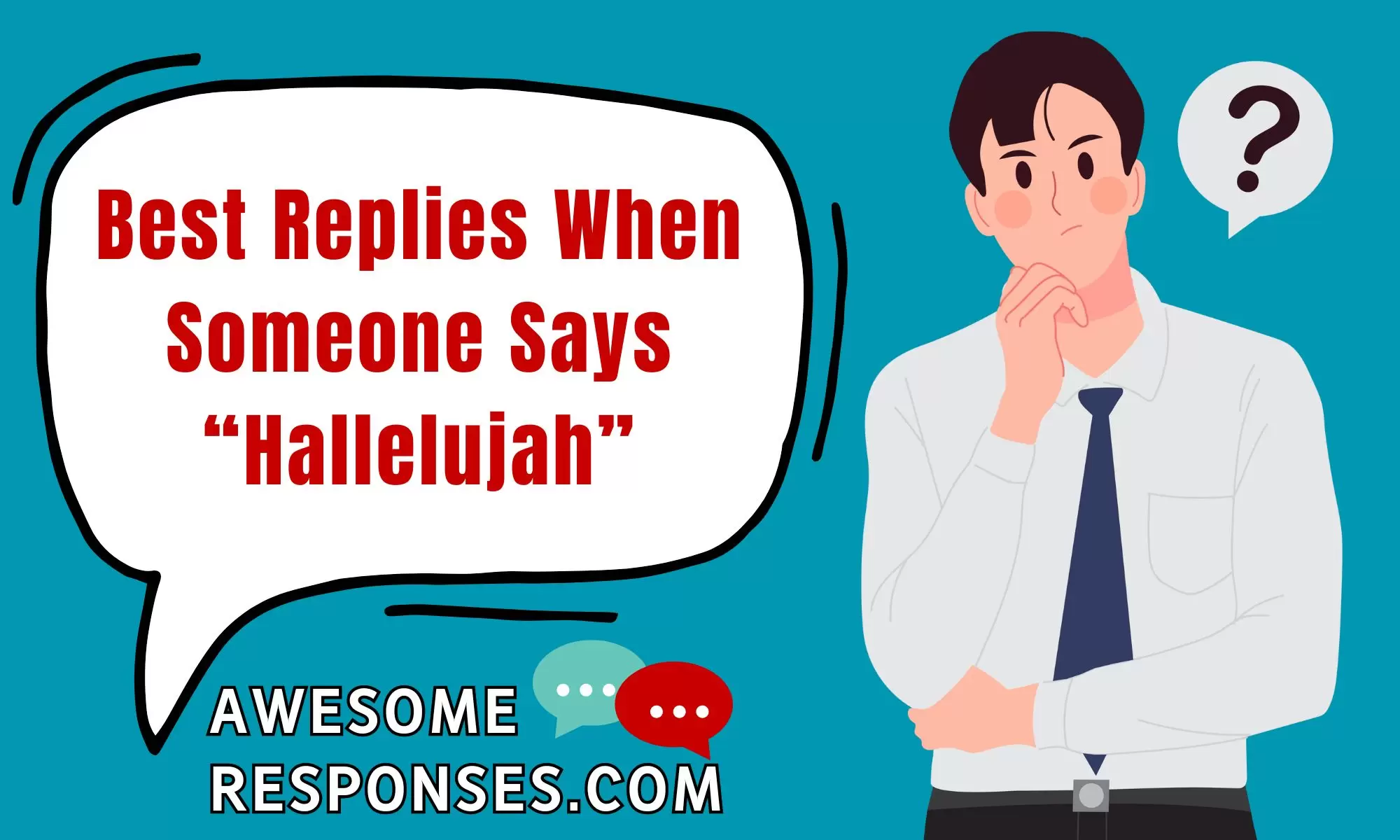Introduction
When someone utters the word “Hallelujah,” it’s an expression of joy, gratitude, or pure jubilation. Responding appropriately to such a spirited exclamation is an art. In this guide, we’ll explore 20 best replies to amplify the positive energy surrounding a “Hallelujah” moment.
1. “Praise the heavens, indeed! What’s making you feel so blessed today?”
Responding with genuine curiosity opens the door for a meaningful conversation. Acknowledge the joy and inquire about the source, showing interest in their positive experience.
Example:
Friend: “Hallelujah!”
You: “Praise the heavens, indeed! What’s making you feel so blessed today?”
In this response, you validate their expression and create a space for them to share the reason behind their joy.
2. “Amen! What’s the good news that has you singing ‘Hallelujah’?”
Emphasizing agreement and expressing interest in the good news behind their exclamation invites them to share the positive aspects of their life, fostering a connection.
Example:
Friend: “Hallelujah!”
You: “Amen! What’s the good news that has you singing ‘Hallelujah’?”
This response encourages them to elaborate on the positive aspects of their life, promoting a sense of camaraderie.
3. “Hallelujah! Are we celebrating something special, or is it just a spontaneous burst of joy?”
Recognizing the possibility of a special occasion or spontaneous happiness adds a touch of humor and curiosity, prompting them to share the reason for their exuberance.
Example:
Friend: “Hallelujah!”
You: “Hallelujah! Are we celebrating something special, or is it just a spontaneous burst of joy?”
This response combines humor with genuine interest, making the interaction light-hearted and engaging.
4. “Hallelujah! I could use some of that positive energy. What’s the secret to your enthusiasm?”

Expressing a desire to share in their positivity while asking about the secret to their enthusiasm encourages them to reflect on and share what’s making them happy.
Example:
Friend: “Hallelujah!”
You: “Hallelujah! I could use some of that positive energy. What’s the secret to your enthusiasm?”
This response not only acknowledges their joy but also expresses a genuine interest in understanding the source of their positivity.
5. “Hallelujah! The universe is in tune with your spirit today. What brought about this moment of exaltation?”
Acknowledging the alignment of their spirit with the universe adds a cosmic touch, creating a warm and inviting atmosphere for them to share their joyous moment.
Example:
Friend: “Hallelujah!”
You: “Hallelujah! The universe is in tune with your spirit today. What brought about this moment of exaltation?”
This response infuses a sense of connection with the cosmic forces, making the conversation more whimsical and enjoyable.
6. “Hallelujah! I’m ready to join the chorus. What has you rejoicing right now?”
Expressing a willingness to join in their joyous moment and asking about the cause of their celebration shows enthusiasm and fosters a sense of shared happiness.
Example:
Friend: “Hallelujah!”
You: “Hallelujah! I’m ready to join the chorus. What has you rejoicing right now?”
This response actively involves you in their celebration, creating a shared experience of joy.
Celebrating Presidential Excellence: 25 Best Responses to “Happy President’s Day
7. “Praise be! What’s the story behind this ‘Hallelujah’ moment of yours?”
Using the phrase “Praise be” adds a touch of traditional exclamation, while asking about the story behind their ‘Hallelujah’ moment encourages them to share the narrative.
Example:
Friend: “Hallelujah!”
You: “Praise be! What’s the story behind this ‘Hallelujah’ moment of yours?”
This response combines a traditional expression with a genuine curiosity about the story, making the interaction more interesting.
8. “Hallelujah! Your vibe is contagious. Care to share the source of your elation?”
Complimenting the contagious nature of their vibe and asking about the source of their elation acknowledges their positive energy while expressing interest in their happiness.
Example:
Friend: “Hallelujah!”
You: “Hallelujah! Your vibe is contagious. Care to share the source of your elation?”
This response recognizes their positive impact and invites them to open up about what’s making them happy.
9. “Amen to that! What’s inspired this burst of jubilation in your world?”
Acknowledging agreement with an “Amen” and asking about the inspiration behind their burst of jubilation shows a shared connection and interest in their personal experience.
Example:
Friend: “Hallelujah!”
You: “Amen to that! What’s inspired this burst of jubilation in your world?”
This response aligns with their expression and encourages them to share the inspiration behind their joyful outburst.
10. “Hallelujah! I can feel the positive vibes. What’s the occasion?”
Sensing and appreciating the positive vibes, while inquiring about the occasion, creates an atmosphere of celebration and curiosity about the events leading to their exclamation.
Example:
Friend: “Hallelujah!”
You: “Hallelujah! I can feel the positive vibes. What’s the occasion?”
This response directly connects with the positive energy and expresses curiosity about the specific occasion.
11. “Praise the Lord! Your ‘Hallelujah’ just brightened my day. What’s the reason behind it?”
Using the phrase “Praise the Lord” adds a religious touch while expressing how their ‘Hallelujah’ brightened your day, and asking about the reason behind it deepens the connection.
Example:
Friend: “Hallelujah!”
You: “Praise the Lord! Your ‘Hallelujah’ just brightened my day. What’s the reason behind it?”
This response combines religious and personal elements, creating a meaningful exchange.
12. “Hallelujah! I’m all ears. What has you singing praises today?”
Expressing eagerness to listen and asking about what has them singing praises demonstrates active interest and encourages them to share their positive experiences.
Example:
Friend: “Hallelujah!”
You: “Hallelujah! I’m all ears. What has you singing praises today?”
This response makes it clear that you are genuinely interested in hearing about their reasons for joy.
13. “Amen and hallelujah! What’s the good word that has you in such high spirits?”
Combining both “Amen” and “Hallelujah” expresses a double dose of agreement and joy, while asking about the good word that has them in high spirits prompts them to share positive news.
Example:
Friend: “Hallelujah!”
You: “Amen and hallelujah! What’s the good word that has you in such high spirits?”
This response playfully combines the two expressions and encourages them to share the positive news.
14. “Hallelujah! The energy in that exclamation is uplifting. What brought it on?”
Complimenting the uplifting energy of their exclamation and asking about the cause creates a positive atmosphere and invites them to share the reasons behind their joy.
Example:
Friend: “Hallelujah!”
You: “Hallelujah! The energy in that exclamation is uplifting. What brought it on?”
This response acknowledges the positive impact of their expression and encourages them to share the backstory.
15. “Praise be! I’m curious—what’s prompting this ‘Hallelujah’ from you right now?”
Using “Praise be” expresses admiration for their expression, and asking about the prompt for their ‘Hallelujah’ shows genuine curiosity about the reasons behind their joy.
Example:
Friend: “Hallelujah!”
You: “Praise be! I’m curious—what’s prompting this ‘Hallelujah’ from you right now?”
This response combines a traditional expression with a straightforward curiosity, creating an engaging dynamic.
16. “Hallelujah! The positive vibes are contagious. What’s the occasion for this celebration?”
Acknowledging the contagious nature of positive vibes and inquiring about the occasion for their celebration emphasizes a shared experience and interest in their joy.
Example:
Friend: “Hallelujah!”
You: “Hallelujah! The positive vibes are contagious. What’s the occasion for this celebration?”
This response actively engages with their positive energy and seeks to understand the cause for celebration.
17. “Amen to that! Your ‘Hallelujah’ caught my attention. What’s the cause for celebration?”
Affirming agreement with an “Amen” and expressing how their ‘Hallelujah’ caught your attention creates a connection and encourages them to share the cause for celebration.
Example:
Friend: “Hallelujah!”
You: “Amen to that! Your ‘Hallelujah’ caught my attention. What’s the cause for celebration?”
This response aligns with their expression and prompts them to share the reason behind their celebration.
18. “Hallelujah! I’m all for spreading joy. What’s making you shout praises today?”

Expressing a shared enthusiasm for spreading joy and asking about what’s making them shout praises shows a positive and supportive attitude, creating a lively interaction.
Example:
Friend: “Hallelujah!”
You: “Hallelujah! I’m all for spreading joy. What’s making you shout praises today?”
This response not only acknowledges their joy but also expresses a shared commitment to spreading positivity.
19. “Praise the heavens! Your ‘Hallelujah’ has me intrigued. What’s the good news?”
Using “Praise the heavens” expresses admiration, and asking about the good news behind their ‘Hallelujah’ conveys genuine curiosity about the positive developments.
Example:
Friend: “Hallelujah!”
You: “Praise the heavens! Your ‘Hallelujah’ has me intrigued. What’s the good news?”
This response combines a traditional expression with curiosity, creating an interesting and inviting atmosphere.
20. “Hallelujah! Your positive spirit is contagious. What’s the reason behind your joyous proclamation?”
Acknowledging the contagious nature of their positive spirit and asking about the reason behind their joyous proclamation shows genuine interest in their happiness.
Example:
Friend: “Hallelujah!”
You: “Hallelujah! Your positive spirit is contagious. What’s the reason behind your joyous proclamation?”
This response not only compliments their positive spirit but also encourages them to share the story behind their joyous expression.
Conclusion
In the symphony of life, a “Hallelujah” serves as a joyful note that deserves a harmonious response. The key is to acknowledge, engage, and express genuine interest. Whether it’s a celebration, good news, or spontaneous joy, these 20 responses provide a diverse repertoire to respond to the exuberance encapsulated in a simple “Hallelujah.” So, the next time you encounter this jubilant exclamation, consider these responses to create a moment of shared joy and connection.

It’s James Wilson, your quick-witted guide at “Awesome Responses.” I’ve been navigating the world of clever and funny replies with lightning speed, bringing my knack for awesome responses to the forefront. With a treasure trove of experience, I’m here to help you master the art of quick and clever replies. Join me on this journey, and let’s turn your responses into pure awesomeness!













